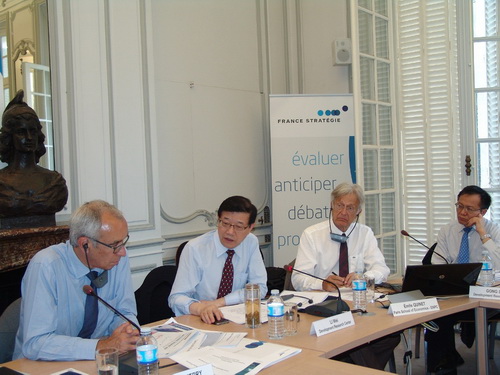Sino-French seminar on public policy evaluation
Jul 08,2015
 |
|
The DRC and France Stratégie hold a seminar on public policy evaluation in China and France, in Paris, with Li Wei (2nd L), President of DRC, and Jean Pisani-Ferry (1st L), Director of France Stratégie,attending. |
The Chinese Development Research Center of the State Council (DRC) and France Stratégie (CGSP), both of them think tanks that serve their respective central government, held a seminar on public policy evaluation in China and France, in Paris, France, on July 2.
They established cooperative partnership in 2014 as a part of a Sino-French senior-level economic and financial dialogue framework, deciding to hold seminars on major economic and social policy problems in turns.
This meeting, the second of its kind, had delegations from governmental departments, think tanks, and universities of both countries to discuss how to evaluate public policies, trade policies, and public investment policies.
Li Wei, President of the DRC, was on hand to address the gathering, where he said that China has been developing a system to evaluate its public policies, with governmental think tanks playing an increasingly important role while facing different interest groups.
Public policy evaluation, according to Li, is an indispensible part of modern national governance. Since government think tanks are close to decision-makers and at the same time independent from other government departments, they have advantages in evaluating public policies, such as faster communication and sufficient information, and a relatively objective and fair approach.
Li also said that government think tanks need to deal with the challenges of insufficient capacity and staff shortages, in addition to be professional, scientific, and open-minded to make sure the evaluation objectively, fairly, and accurately.
Jean Pisani-Ferry, Director of France Stratégie, explained to the gathering that their major task is to do policy evaluation and that their main challenges are disagreements between policy objective and public expectations, vague goals, insufficient budget, no guarantee on the time needed for evaluation, and conflict between data acquisition and privacy.
The two organizations agreed that they need to give priority to serving the public in policy evaluations and should use scientific methods, such as theoretical analysis, model calculations, field investigations, opinion polls, and pilots while considering the economy, society, history, and reality. They need to respect the truth and reflect different groups' interests, so as to present the pros and cons of policies which are references for government decision-makers.
The two said they will increase cooperation and communications in policy studies and evaluations.
Taking part in the meeting included Hou Yongzhi, Director-General of DRC's Department of Development Strategy and Regional Economy, Zhao Jinping, Director-General of its Research Department of Foreign Economic Relations, and Gong Sen, Director-General of the Institute of Public Administration and Human Resources.














